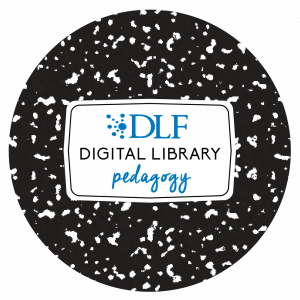Pedagogy: Difference between revisions
Appearance
| Line 2: | Line 2: | ||
= '''DLF Digital Library Pedagogy Group''' = | = '''DLF Digital Library Pedagogy Group''' = | ||
The Digital Library Pedagogy Working Group, also known as #DLFteach, is a grassroots community of proctice formed thanks to practitioner interest following the 2015 DLF Forum. We empower digital library practitioners to see themselves as teachers and equip teaching librarians to engage learners in how digital library technologies shape our knowledge infrastructure. The group is open to anyone interested in learning about or collaborating on digital library pedagogy. | The Digital Library Pedagogy Working Group, also known as #DLFteach, is a grassroots community of proctice formed thanks to [https://www.diglib.org/join-the-new-dlf-digital-library-pedagogy-interest-group practitioner interest] following the 2015 DLF Forum. We empower digital library practitioners to see themselves as teachers and equip teaching librarians to engage learners in how digital library technologies shape our knowledge infrastructure. The group is open to anyone interested in learning about or collaborating on digital library pedagogy. | ||
==Get involved== | ==Get involved== | ||
Revision as of 11:00, 23 September 2019

DLF Digital Library Pedagogy Group
The Digital Library Pedagogy Working Group, also known as #DLFteach, is a grassroots community of proctice formed thanks to practitioner interest following the 2015 DLF Forum. We empower digital library practitioners to see themselves as teachers and equip teaching librarians to engage learners in how digital library technologies shape our knowledge infrastructure. The group is open to anyone interested in learning about or collaborating on digital library pedagogy.
Get involved
- Join our Google Group.
- Check in with us during #DLFteach office hours on Slack every Tuesday afternoon, 2-3pm ET.
- Participate in a #DLFteach Twitter chat.
Subgroups
Resources
Archived Documentation
As Digital Library Pedagogy projects conclude, they will be archived with the Open Science Framework.

